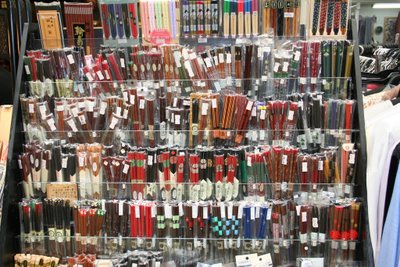my oh-so-normal life
About Me
- Name: agiawb
- Location: California, United States
There are no random acts. We are all connected. You can no more separate one life from another than you can separate a breeze from the wind. (the five people you meet in heaven)
Wednesday, May 31, 2006
Tuesday, May 30, 2006
Lost Baggage
Depending on where you are arriving, lost baggage can be a blessing, a nuisance, or a tragedy. If you are going home where you have plenty of other clothes, lost baggage can be a blessing. Especially if it’s heavy since the airlines will deliver it for you. If you are traveling, lost baggage either becomes a nuisance or a tragedy. (Unless, of course, you wanted to go shopping for a new wardrobe. In this case, arriving at your destination sans equipage may be just what the shopping gods ordered.) Whether this is a tragedy or a nuisance is dictated (in my opinion) by who you are and your place of arrival. If you are a Westerner arriving in Japan (or another Asian country), this is usually a tragedy. Doubly so if you did not pack any underwear in your carry-on. Good luck and happy hunting for clothes that fit.
I always like to have a contingency plan. I make sure that I keep all my underwear as well as one or two outfits in my carry-on when I am outbound. I had a wake-up call as I arrived in Sydney, only to discover that my backpack and pilates mat were still State-side. I had one extra outfit and one extra shirt in my carry-on. I was thrilled to discover that I had packed a pair of dress shoes in my carry-on as I was wearing turquoise sneakers. (What was I thinking?) My luck continued when my backpack showed up the following day. However, this has forced me to reconsider how much clothing I actually need for a business trip or even just a vacation in addition to what I actually wear on the plane. I have gotten to the point where I really hate lugging heavy bags, so I have been paring back. My current philosophy is to bring clothes that I was going to donate to charity anyway and leave them along the way so as to lighten the load on the way home. I hope that one day I will get to the point of one small bag to last a week or two, but at this point, I just don’t see that in the cards.
Depending on where you are arriving, lost baggage can be a blessing, a nuisance, or a tragedy. If you are going home where you have plenty of other clothes, lost baggage can be a blessing. Especially if it’s heavy since the airlines will deliver it for you. If you are traveling, lost baggage either becomes a nuisance or a tragedy. (Unless, of course, you wanted to go shopping for a new wardrobe. In this case, arriving at your destination sans equipage may be just what the shopping gods ordered.) Whether this is a tragedy or a nuisance is dictated (in my opinion) by who you are and your place of arrival. If you are a Westerner arriving in Japan (or another Asian country), this is usually a tragedy. Doubly so if you did not pack any underwear in your carry-on. Good luck and happy hunting for clothes that fit.
I always like to have a contingency plan. I make sure that I keep all my underwear as well as one or two outfits in my carry-on when I am outbound. I had a wake-up call as I arrived in Sydney, only to discover that my backpack and pilates mat were still State-side. I had one extra outfit and one extra shirt in my carry-on. I was thrilled to discover that I had packed a pair of dress shoes in my carry-on as I was wearing turquoise sneakers. (What was I thinking?) My luck continued when my backpack showed up the following day. However, this has forced me to reconsider how much clothing I actually need for a business trip or even just a vacation in addition to what I actually wear on the plane. I have gotten to the point where I really hate lugging heavy bags, so I have been paring back. My current philosophy is to bring clothes that I was going to donate to charity anyway and leave them along the way so as to lighten the load on the way home. I hope that one day I will get to the point of one small bag to last a week or two, but at this point, I just don’t see that in the cards.
Monday, May 29, 2006
Cerebration
Word of the Day for Sunday, May 28, 2006
cerebration \ser-uh-BRAY-shuhn\, noun:The act or product of thinking; the use of the power of reason; mental activity; thought.
Cerebration is ultimately derived from Latin cerebrum, "brain." The related verb cerebrate means "to use the power of reason; to think."
And here I thought it was a Japanese person talking about a party....
Word of the Day for Sunday, May 28, 2006
cerebration \ser-uh-BRAY-shuhn\, noun:The act or product of thinking; the use of the power of reason; mental activity; thought.
Cerebration is ultimately derived from Latin cerebrum, "brain." The related verb cerebrate means "to use the power of reason; to think."
And here I thought it was a Japanese person talking about a party....
Saturday, May 27, 2006
Engrish VI



Berry is small and puply fruits. It's adorable, delisious, and juicy, holding power that shoots out buds.
"Hairs BERRY" is the hair salon full of charm like berries.

 Fresh aroma and flavor spread throughout your mouth. Rich flavor makes you all happy around a table. Careful selection of good materials and our hearty best skill produce the real taste.
Fresh aroma and flavor spread throughout your mouth. Rich flavor makes you all happy around a table. Careful selection of good materials and our hearty best skill produce the real taste. 
Thursday, May 25, 2006
Big Tree・大樹
Recently, So and I went to TGI Fridays in Tokyo. It was not necessarily our choice but rather dictated by the fact that I had luggage and there were no lockers to be had due to it being the last day of Golden Week. Thus, off we trotted to Friday’s for lunch and a chat.
Now, Fridays is located in a section of town frequented by foreign business travelers and next to the Le Meridien Hotel. Lots of foreigners visit Fridays. As we entered, we requested a table for two in Japanese. We eventually ordered from the hostess as our server had not yet shown up. When he did, he told us that he just wanted to introduce himself as he would be taking care of us that day.
His English was faulty and rough to understand. So shot me a looked and asked me en español if we should tell him that we speak Japanese. I gave her a look back and shrugged my shoulders. She said, “Aw, let’s let him practice.” He paused and looked at us and then asked, “Do you speak English?” When we answered in the affirmative, he continued his spiel and said, “My name is…” Here is when the trouble began. I misunderstood what he said and thought he said “Victory.” Before I knew what I was doing, “ちょっと待って。ビクトリは日本語の名前ではないですよ。” (Hold on a second, Victory is not a Japanese name) came flying out of my mouth. As I am saying this, I turn to look over my left shoulder at him and notice that his name tag says “Big Tree.” The look of surprise on his face was evident as he stared at us and asked if we spoke Japanese. Yes, again. So I say, “Oh what’s your name? Ohki-san?” He tells me, “No, it’s Daiki.” (The meaning is Big Tree. 大樹)
The truth of the matter is that Big Tree was a tad bit strange, but in the end, we got a kick out the whole incident. It made our lunch all the more memorable. So even wants me to call her Big Tree now. Hmmmmmmmmmmmm.
Recently, So and I went to TGI Fridays in Tokyo. It was not necessarily our choice but rather dictated by the fact that I had luggage and there were no lockers to be had due to it being the last day of Golden Week. Thus, off we trotted to Friday’s for lunch and a chat.
Now, Fridays is located in a section of town frequented by foreign business travelers and next to the Le Meridien Hotel. Lots of foreigners visit Fridays. As we entered, we requested a table for two in Japanese. We eventually ordered from the hostess as our server had not yet shown up. When he did, he told us that he just wanted to introduce himself as he would be taking care of us that day.
His English was faulty and rough to understand. So shot me a looked and asked me en español if we should tell him that we speak Japanese. I gave her a look back and shrugged my shoulders. She said, “Aw, let’s let him practice.” He paused and looked at us and then asked, “Do you speak English?” When we answered in the affirmative, he continued his spiel and said, “My name is…” Here is when the trouble began. I misunderstood what he said and thought he said “Victory.” Before I knew what I was doing, “ちょっと待って。ビクトリは日本語の名前ではないですよ。” (Hold on a second, Victory is not a Japanese name) came flying out of my mouth. As I am saying this, I turn to look over my left shoulder at him and notice that his name tag says “Big Tree.” The look of surprise on his face was evident as he stared at us and asked if we spoke Japanese. Yes, again. So I say, “Oh what’s your name? Ohki-san?” He tells me, “No, it’s Daiki.” (The meaning is Big Tree. 大樹)
The truth of the matter is that Big Tree was a tad bit strange, but in the end, we got a kick out the whole incident. It made our lunch all the more memorable. So even wants me to call her Big Tree now. Hmmmmmmmmmmmm.
Tuesday, May 23, 2006
Monday, May 22, 2006
Wednesday, May 17, 2006
Humor Is Cultural
Culture is ingrained in each of us, often without our realization. Whenever you leave your home country, this is something that becomes quite obvious. In addition to the myriad of really obvious things like language, food, transportation, clothing, etc., other things such as references to TV shows, sports teams, stores, etc. are often lost on people who do not share your culture. However, there are other, more subtle, things that make you suddenly realize you’ve run into a cultural brick wall.
The other day, I was buying some donuts for my office. The donut experience in Japan is quite different from the US, and the donut shop you will find most everywhere is Mister Donut. There was a Mister Donut near my house growing up, so this is somewhat natsukashii (懐かしい—nostalgic), but the donut selection is not the only difference. In Japan, donuts are purchased individually; there is no price per dozen. You enter the store, get a tray and a pair of thongs, and as you select the donuts you want, you put them on your tray.
I wanted to make sure that there were plenty of donuts, so I had twenty on the small tray. It looked like a mountain of donuts. As I approached the register, the boy behind the counter asked me, “お持ち帰りですか。” (Is this for take out?) As I started to say yes, I changed mid-stream and said in Japanese, “No, I’m going to eat them all here.” He knew he’d heard something but was not sure what. He looked up at me and repeated his question, “Omochi kaeri desuka?” and then began to say “take-out” with Japanese pronunciation. I cut him off and said, “No, I’m really hungry, so I’m going to eat them all here. Could you please put them on a large plate for me?” He stood there, staring back at me, not knowing how to react. He was frozen. He stared at me, and as the corner of my lips began to turn up into a smile, I told him, “It’s a joke.” He bent over, looking relieved, and got out the boxes to pack up the donuts.
When I later told Sa the story, she first said that the question was ridiculous as it should be obvious that anyone with that many donuts was not going to eat them in the store. However, she added that if I wanted to joke, my initial response to his take-out question should have been, “Yes, for take-out. I can’t eat this many donuts at one time.” Humor often does not translate.
Culture is ingrained in each of us, often without our realization. Whenever you leave your home country, this is something that becomes quite obvious. In addition to the myriad of really obvious things like language, food, transportation, clothing, etc., other things such as references to TV shows, sports teams, stores, etc. are often lost on people who do not share your culture. However, there are other, more subtle, things that make you suddenly realize you’ve run into a cultural brick wall.
The other day, I was buying some donuts for my office. The donut experience in Japan is quite different from the US, and the donut shop you will find most everywhere is Mister Donut. There was a Mister Donut near my house growing up, so this is somewhat natsukashii (懐かしい—nostalgic), but the donut selection is not the only difference. In Japan, donuts are purchased individually; there is no price per dozen. You enter the store, get a tray and a pair of thongs, and as you select the donuts you want, you put them on your tray.
I wanted to make sure that there were plenty of donuts, so I had twenty on the small tray. It looked like a mountain of donuts. As I approached the register, the boy behind the counter asked me, “お持ち帰りですか。” (Is this for take out?) As I started to say yes, I changed mid-stream and said in Japanese, “No, I’m going to eat them all here.” He knew he’d heard something but was not sure what. He looked up at me and repeated his question, “Omochi kaeri desuka?” and then began to say “take-out” with Japanese pronunciation. I cut him off and said, “No, I’m really hungry, so I’m going to eat them all here. Could you please put them on a large plate for me?” He stood there, staring back at me, not knowing how to react. He was frozen. He stared at me, and as the corner of my lips began to turn up into a smile, I told him, “It’s a joke.” He bent over, looking relieved, and got out the boxes to pack up the donuts.
When I later told Sa the story, she first said that the question was ridiculous as it should be obvious that anyone with that many donuts was not going to eat them in the store. However, she added that if I wanted to joke, my initial response to his take-out question should have been, “Yes, for take-out. I can’t eat this many donuts at one time.” Humor often does not translate.
Monday, May 15, 2006
Sunday, May 14, 2006
Friday, May 12, 2006
Quote of the Day
-courtesy of M (sorry to once again cut into your 15 minutes of fame!)
International version:
"They were all over him like a fat kid on a Smartie."
US version:
"They were all over him like a fat kid on an M&M."
-courtesy of M (sorry to once again cut into your 15 minutes of fame!)
International version:
"They were all over him like a fat kid on a Smartie."
US version:
"They were all over him like a fat kid on an M&M."
Tuesday, May 09, 2006
Where Everybody Knows Your Name
Singing Bar Diva, the best karaoke bar in Osaka
Singing Bar Diva, the best karaoke bar in Osaka
 Karaoke in Japan most often takes place in a “Karaoke Box,” a room that you rent with your friends and sing to your heart’s content. However, being a party of one, I was looking for a venue where I would not be alone in a room. (Although R told me it was a perfect situation. He said, “Go to the front desk, say ‘La, la, la. Oh! I need to practice. A room for one please.’”) I guess that way you don’t need to fight for the mike with anyone, but it’s a good way to get laryngitis.
Karaoke in Japan most often takes place in a “Karaoke Box,” a room that you rent with your friends and sing to your heart’s content. However, being a party of one, I was looking for a venue where I would not be alone in a room. (Although R told me it was a perfect situation. He said, “Go to the front desk, say ‘La, la, la. Oh! I need to practice. A room for one please.’”) I guess that way you don’t need to fight for the mike with anyone, but it’s a good way to get laryngitis.A co-worker found Diva for me on-line. I went the first time with another co-worker in Japan for a week. The second time I returned alone. They remembered me, and I became a 常連 (a regular.) On my third visit, one of the employees yelled out my name as I came through the door. The Cheers song ran through my head: “where everybody knows your name.”
If you’re ever in Osaka, give the Singing Bar Diva a try. They have a large selection of English songs. The staff is extremely nice and an incredible group of singers. They’ll make you feel at home, and you’ll have a great time. You will want to go back. As often as you can. Because everyone will know your name.
Cheers to the Singing Bar Diva

Monday, May 08, 2006
Sunday, May 07, 2006
Saturday, May 06, 2006
Kinchoh・緊張
When I even hear the word kinchoh (緊張), I start to feel a tightening in my chest. I’m always at a loss for a good translation, but spacealc lists the meaning as knot, stress, tension, tensity, tightness, tonus. In Japan, whenever you do not conform to Japanese societal and cultural rules, it is hazukashii (恥ずかしい: embarrassing), and the result is usually that you end up feeling kinchoh. I am sure that there are a lot of foreigners living in Japan out there who do not internalize these situations, but there are those of us who (at times) do.
Last week, So and I were discussing this situation. In light of the upcoming warmer weather, she was talking about sweating and that in Japan it’s hazukashii to have sweat marks on your clothes, so she makes sure not to buy colors that easily show sweat marks. The Japanese just don’t seem to sweat as much as Westerners, so this is just another in a long list of things that make you stick out and not conform.
I had my own experience on Friday. I met my host parents for lunch, and let my host father pick the restaurant. I don’t know why I never think of this ahead of time, but that always turns out to be a mistake on my part. He loves to go to really fancy places. I cringe. Kinchoh. I never feel that fancy to begin with, but in Japan it is a million times worse. I know that most places I go, people will stare at me. In fancy restaurants, it’s not just the staring; the staff is overly observant. They will let you (foreigners and Japanese alike) know how you are supposed to act. For example, take the server who decided it was time for me to put my napkin on my lap, so she did it for me. I can just never relax in those places. Luckily, it’s not just me, my host mother feels the same way.
It’s funny that I let this affect me because there are times when I just decide that no matter what I do, people are going to stare, so I might as well give them a good reason. Thursday was a good example of that. It was a beautiful day, warm, and one of the first this year in Japan. I went to the gym and pool at the Minato-ku Sports Center and decided to walk back to So’s wearing my bathing suit with spandex leggings. I anticipated more stares than usual and perhaps felt the stares because I was self-conscious than usual. I know that beachside in the US is the only place I could get away with the same outfit without the stare. However, halfway back I didn’t feel the looks upon me, although I did a bit as I ducked into the grocery store to pick up lunch.
When I even hear the word kinchoh (緊張), I start to feel a tightening in my chest. I’m always at a loss for a good translation, but spacealc lists the meaning as knot, stress, tension, tensity, tightness, tonus. In Japan, whenever you do not conform to Japanese societal and cultural rules, it is hazukashii (恥ずかしい: embarrassing), and the result is usually that you end up feeling kinchoh. I am sure that there are a lot of foreigners living in Japan out there who do not internalize these situations, but there are those of us who (at times) do.
Last week, So and I were discussing this situation. In light of the upcoming warmer weather, she was talking about sweating and that in Japan it’s hazukashii to have sweat marks on your clothes, so she makes sure not to buy colors that easily show sweat marks. The Japanese just don’t seem to sweat as much as Westerners, so this is just another in a long list of things that make you stick out and not conform.
I had my own experience on Friday. I met my host parents for lunch, and let my host father pick the restaurant. I don’t know why I never think of this ahead of time, but that always turns out to be a mistake on my part. He loves to go to really fancy places. I cringe. Kinchoh. I never feel that fancy to begin with, but in Japan it is a million times worse. I know that most places I go, people will stare at me. In fancy restaurants, it’s not just the staring; the staff is overly observant. They will let you (foreigners and Japanese alike) know how you are supposed to act. For example, take the server who decided it was time for me to put my napkin on my lap, so she did it for me. I can just never relax in those places. Luckily, it’s not just me, my host mother feels the same way.
It’s funny that I let this affect me because there are times when I just decide that no matter what I do, people are going to stare, so I might as well give them a good reason. Thursday was a good example of that. It was a beautiful day, warm, and one of the first this year in Japan. I went to the gym and pool at the Minato-ku Sports Center and decided to walk back to So’s wearing my bathing suit with spandex leggings. I anticipated more stares than usual and perhaps felt the stares because I was self-conscious than usual. I know that beachside in the US is the only place I could get away with the same outfit without the stare. However, halfway back I didn’t feel the looks upon me, although I did a bit as I ducked into the grocery store to pick up lunch.
Wednesday, May 03, 2006
Chopsticks・お箸
In my life I have met two types of non-Asians: those who are enthusiastic about using chopsticks and those who avoid it like the plague.
In my life I have met two types of non-Asians: those who are enthusiastic about using chopsticks and those who avoid it like the plague.

For those of us who did not grow up using chopsticks, the concept can be daunting. I find it amusing, though, that I have several Japanese friends who would prefer a fork to chopsticks. Anytime I am with a group of Asians and one person asks for a fork, the result is one of two situations:
1. The server brings one fork and gives it to me since I’m the token white chick.
2. The server brings two forks, one for me and one for the person who really wanted one.
It’s interesting to see how culture forms people, how it is ingrained in us without our recognition. When I cook Japanese food, I use chopsticks: for mixing, for frying, etc. That’s how I learned to do it; that’s the way it’s supposed to be done. I’ll never forget when I went home after my first year in Japan. My mother laughed out loud when she saw me beating an egg with chopsticks. It had never occurred to me to do it any other way because I was preparing a Japanese dish. But, by the same token, it doesn’t occur to me to pick up a pair of chopsticks to perform the same task when making Western food.
If you catch me in Japan and ask to look in my bag, most likely you will find a pair of chopsticks stashed in there so that I can avoid using waribashi (割り箸), wooden throw-away chopsticks. No Japanese person I know does that, but they all think it’s great that I do. I love my chopsticks (all twenty or so pairs that I have), and I can’t imagine what I would do without them.
























